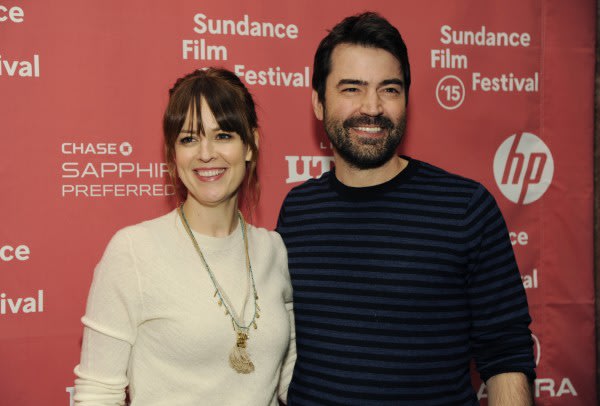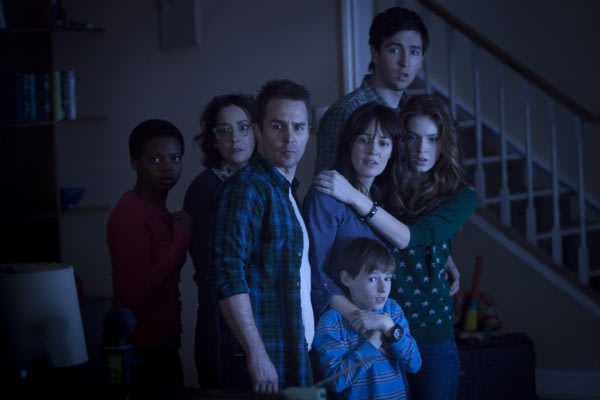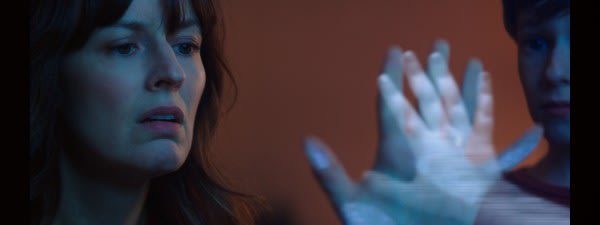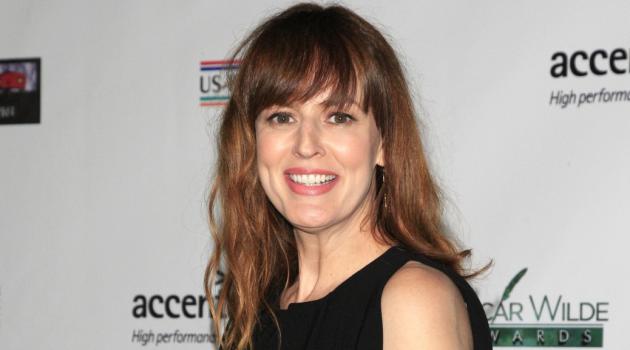
Photo by: Twentieth Century Fox
Rosemarie DeWitt,
left, as Amy Bowen reaches out to her daughter, who's being held captive
by terrifying apparitions, in a scene from 'Poltergeist.' Kyle Catlett,
right, portrays her son Griffin.
Unlike the unwanted,
supernatural characters at its core, director Gil Kenan's "Poltergeist"
does not overstay its welcome. Playing somewhat like a Cliff's Notes
version of the Tobe Hooper/Steven Spielberg classic, this re-do
recreates, and sometimes improves upon, the many iconic moments from the
1982 feature, wasting little time to deliver one round after another of
effective scares. That they don't feel all that fresh is due not only
to its remake status but also because so many other effective fright
films in recent years have covered similar territory, making it
difficult for Kenan and screenwriter David Lindsay-Abaire to bring
anything new to the table.
The premise is a familiar one, so Kenan dispenses with it
quickly — Eric and Amy Bowen (Sam Rockwell and Rosemarie DeWitt, both
very good) are in the market to downsize, as he's been recently laid
off, and find a heck of a deal on a roomy house in a nice subdivision.
Not wanting to look this gift horse in the mouth, they close on it, move
in and the spooky shenanigans begin. Their youngest, Madison (Kennedi
Clements), begins having conversations with someone or something in her
closet, middle-child Griffin (Kyle Catlett) draws the short straw and
gets the attic bedroom where he discovers a creepy clown collection,
while their eldest Kendra (Saxon Sharbino) ... well, she's a teenage
girl so she's too wrapped up in herself to be aware of things that go
bump in the night.
Films of this sort live and die by their set pieces and
Kenan is able to stage them in such a way that more than a few genuine
scares are delivered. Utilizing computer graphics to their full
potential, the director creates a sense of pervasive malevolence in the
Bowens' home that is genuinely unsettling. Kendra's encounter with
muck-covered ghosts in their garage is unsettling, while the infamous
tree from the first film takes on a life, and indeed a personality, of
its own here that prompted giggles of anticipation as to what it had in
store for poor Griffin. As for the clowns, let's just say if you suffer
from coulrophobia, dismiss any idea you may have of seeing this film
thinking that in facing your fear you may be cured. This is a
wrong-headed notion that should be abandoned at all costs. You've been
warned.
With films of this sort, so much depends on the skill of its
child performers, and Kenan is fortunate to have found Clements and
Catlett. The former is key to our buying into the premise and that she's
able to convey a belief in these malevolent intruders not only makes it
easier for the audience to play along but raises the emotional stakes
as well. Catlett is also very good, going from a tremulous child to one
of great bravery and confidence, all of it done with nary a
self-conscious gesture or line reading. Unlike most child performers, we
look forward to their scenes as opposed to dreading them. As expected,
Rockwell and DeWitt are solid while the script's one innovation — that
of bringing in a rakish paranormal investigator as opposed to the minute
elderly psychic played by Zelda Rubinstein in the original — is
justified by the self-aware, humorous turn by Jared Harris as Carrigan
Burke.
As well done as this ghost story is, it can't help but
suffer in comparison to the Hooper original as well as recent entries
such as "Insidious," "The Conjuring," "Sinister" as well as many others.
While Kenan & Co. should be commended for a fine job, they're
unable to scare up anything new where the haunted house genre is
concerned.
Poltergeist ★★★ (out of 4)
Cast: Sam Rockwell, Rosemarie DeWitt, Kennedi Clements, Kyle
Catlett, Jared Harris, Saxon Sharbino, Jane Adams, Susan Heyward and
Nicholas Braun.
Directed by Gil Kenan; produced by Nathan Kahane, Roy Lee, Sam Raimi and Robert Tapert; screenplay by David Lindsay-Abaire.
An MGM Release. 93 minutes. Rated PG-13 (intense frightening
sequences, brief suggestive material and some language) At AMC Village
Mall 6, Carmike 13 and Savoy 16.
Also new in theaters
Wiig struggles mightily to bring life to 'Me'
(★★). Oh, if Eliot Laurence has only rewritten or had someone else take
a crack at his script for "Welcome to Me," director Shira Piven and her
game cast might have really had something special on their hands.
Though running a scant 87 minutes, the film is brimming with worthy,
timely ideas such as the realization of Andy Warhol's prediction that
everyone would be famous for 15 minutes, the need for better services
for the mentally ill and the very nature of the morality of modern
media. Unfortunately, these ideas are referenced but never fully
developed, being used instead as fodder for cheap, awkward laughs while
the film's veteran cast is all but wasted.
From the start, it's obvious that Alice Klieg lives in her
own little world, in a small apartment cluttered with meticulously
categorized VHS tapes of episodes of "The Oprah Winfrey Show," various
swan figurines and a very large bed. She struggles with depression,
tries to work through her problems with the help of her kindly therapist
(Tim Robbins) and looks to Oprah's oeuvre for advice at every turn.
This is a daily battle for her but her routine is forever changed when
she wins $86 million in the California Lottery, an event that allows her
to realize her dream, for better or worse, of writing, starring and
producing her own talk show.
Rich Ruskin (James Marsden), president of the struggling New
Vibrance Channel, is more than happy to let Alice tilt at her windmill
to the tune of $15 million for 100 episodes, much to the chagrin of his
partner and brother Gabe (Wes Bentley), who not only has moral qualms
about this but ultimately falls for the woman who soon becomes an
Internet sensation. Her two-hour shows consist of segments like "You Got
Everything, I Got Nothing," others that feature conversations between
Alice and her mother with a scoreboard tallying how many times they
insult one another as well as re-enactments of traumatic events in her
life. These are always a highlight as they always end with our heroine
in tears, yelling at the poor actresses who've been hired to play her
and her adversaries, only to come to some sort of personal realization.
The script alludes to the fact that Alice's show becomes
something of a sensation but never weighs in on how those in the media
react to it or how it impacts those with a similar diagnosis as Alice.
Equally frustrating is the lack of development where potentially
interesting characters are concerned. Jennifer Jason Leigh is cast as
one of Ruskin's veteran advisers and while we can tell she has a great
deal of experience in the television field, she's never allowed to weigh
in on what is going on; she simply looks frustrated once or twice and
then quits. It's implied that Ruskin himself suffers from a crisis of
conscience once libel suits start pouring into the station, but the
opportunity to provide him with a bit of complexity is wasted as well.
Joan Cusack as the show's director is given short shrift also.
Rarely
do I wish that a movie were longer, but in this case an extra 20
minutes devoted to looking at the ripple effect of Alice's show as well
as providing time for character introspection would have been time well
spent. Unfortunately, much like its main character, "Welcome to Me" is
far too insular for its own good.
Good intentions can't overcome faulty 'Tomorrowland' script
(★★). If good intentions were all that was necessary in making a good
movie, Brad Bird's "Tomorrowland" would be considered an instant
classic. As written by Damon Lindelof and the director, the film is an
earnest plea for the renewal of the sort of national optimism that
fueled the space race, an unabashedly optimistic look at the potential
we have as not simply a species but the planet as a whole. No cynics are
allowed here and while the sincerity Bird and all involved bring is
commendable, it all works in the service of a faulty script that tries
to get far too much mileage out of its flimsy, albeit noble idea.
Ironically, things get off on a rather sour note as one-time
boy genius, now full-time curmudgeon Frank Walker (George Clooney)
recounts for an unseen audience his experiences at the 1964 World's
Fair, which he attended wide-eyed with wonder, presenting his homemade
jetpack to Dr. Nix (Hugh Laurie) in the hopes he may be able to help
with its design flaws. Instead, he's rebuffed but a precocious little
girl named Athena (Raffey Cassidy) takes an interest in him, giving him a
pendant that, when touched, transports him to a magical, futuristic
land where geniuses and visionaries reside, all striving to make the
world a better place.
Flash forward 50 years and we meet Casey Newton (Britt
Robertson), a young woman as bright and eager as Walker once was, whose
unbridled enthusiasm is squashed at every turn by a constant stream of
dire environmental and political events as well as the attitude of jaded
adults. She too comes to the attention of Athena, who passes on her
last magical pendant to her, something that sparks her curiosity, so
much so that she sets out to find out more about it, a journey that
eventually takes her to Walker's doorstep, who wants nothing to do with
her or her questions.
For a movie with such an urgent agenda it takes far ... too
... long ... for it to get to what it really wants to say. Casey's
journey for answers is delayed and detoured by one artificial narrative
roadblock after another as car chases, series of needless questions and
far too many silly misunderstandings keep the film from gaining any
traction and alienates the audience as a result. (Perhaps the most
irritating diversion is Casey's stop at a memorabilia shop that contains
one Disney/Star Wars/Marvel product placement after another. Make a
drinking game out of spotting these and you'll be out of booze in three
minutes.)
Clooney and Robertson both do a fine job but their labors
are for naught. Once the final conflict is revealed the film's ending
proves to be the very definition of "anticlimactic." And while the
ultimate message in "Tomorrowland" is worthwhile and necessary, the sort
of optimism it subscribes to is a bit too nearsighted and naive to
truly take to heart.
For DVR alerts, film recommendations and movie
news, follow Chuck Koplinski on Twitter at @ckoplinski. Koplinski can be
reached via email at chuckkoplinski@gmail.com.
 Ron Livingston and Rosemarie DeWitt (Chris Pizzello/Invision/AP) “I’m terrified of horror movies and I don’t see them, and then I saw The Conjuring with my husband,” she said.
Ron Livingston and Rosemarie DeWitt (Chris Pizzello/Invision/AP) “I’m terrified of horror movies and I don’t see them, and then I saw The Conjuring with my husband,” she said. Rosemarie DeWitt and Sam Rockwell star in Poltergeist (Fox UK) “It
made me really open to the idea of doing something in this genre, and
then when this came along, it was daunting because the original is just
brilliant,” she said.
Rosemarie DeWitt and Sam Rockwell star in Poltergeist (Fox UK) “It
made me really open to the idea of doing something in this genre, and
then when this came along, it was daunting because the original is just
brilliant,” she said. Rosemarie DeWitt in Poltergeist (Fox UK) Rosemarie
also said she helped protect her screen children, particularly Kennedi
Clements, who played her young daughter Madison Bowen.
Rosemarie DeWitt in Poltergeist (Fox UK) Rosemarie
also said she helped protect her screen children, particularly Kennedi
Clements, who played her young daughter Madison Bowen.